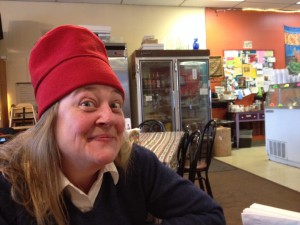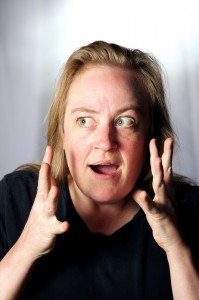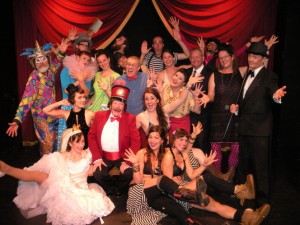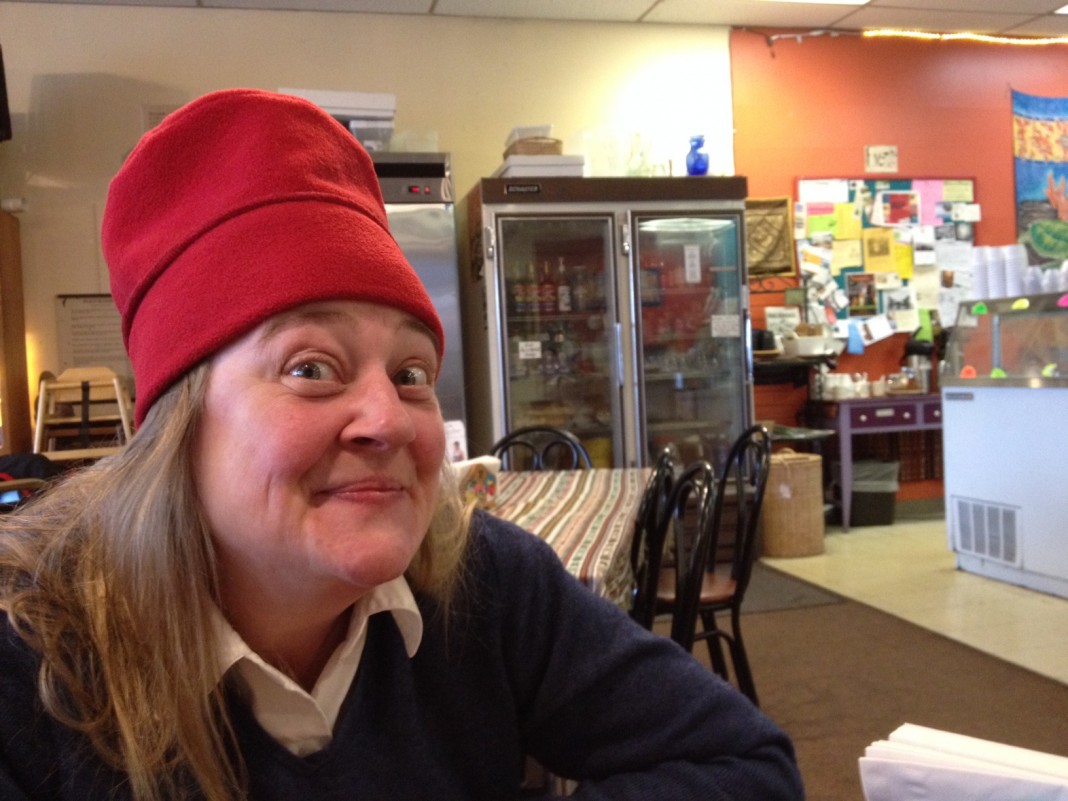Elizabeth Lord calls herself a professional talker. It’s a fitting description.
 Over the past two decades, Lord has left her footprint on the majority of performing spaces around town. She’s an actor with Olympia’s own Playback Theater group, The Heartsparkle Players. In 2007 she and a friend created the annual Lord Franzannian Royal Olympian Spectacular Vaudeville Show, an event she continues to produce. She emcees a variety of different events for organizations like The Olympia Film Society and Oly Bingo Night. She has even dabbled in stand-up comedy.
Over the past two decades, Lord has left her footprint on the majority of performing spaces around town. She’s an actor with Olympia’s own Playback Theater group, The Heartsparkle Players. In 2007 she and a friend created the annual Lord Franzannian Royal Olympian Spectacular Vaudeville Show, an event she continues to produce. She emcees a variety of different events for organizations like The Olympia Film Society and Oly Bingo Night. She has even dabbled in stand-up comedy.
What Elizabeth Lord is known best for, however, is her ability to tell stories. She has performed at Seattle’s Folklife Festival, at local “Tellebrations” and at Stories in the Park. In other words, it’s her job to talk a lot.

I came across Elizabeth at Story Oly, an open mic event Lord and local actress Amy Shephard founded last year. Lord acts as host for the monthly event and usually warms up the audience as the first one to “tell” each night.
“I fell in love with storytelling while an undergraduate student at The Evergreen State College,” she says. “I joined the Olympia Storytelling Guild at age 19. I was drawn to theater and acting as well, but storytelling, and folktales and world mythology (were) deeply moving to me. While in college I submerged myself in learning about oral storytelling, oral cultures, and oral history.”
Lord remembers when she first realized she had a knack for storytelling. She was with a group of friends, hanging out in a college dorm room when someone challenged her to “tell.”
“I told a story I remembered from a collection of Canadian folktales I had read religiously in 4th grade, ‘The Princess of Tomboso.’ In fact, I loved the book so much, I never returned it to my teacher. The room fell silent as I told. I couldn’t believe they were listening to me tell a folktale I liked as a child. All ears were on me. What a rush. At the end they applauded.”
“As a teenager I realized the world of professional acting is extremely competitive, and not very practical. Plus (there is) the pressure to be young and beautiful – which I knew doesn’t last. Whereas with a storytelling career, one need not remain young and beautiful nor would there be a lot of competition. But storytelling would satisfy my desire to perform and allow me to explore folktales, mythology, and celebrate the oral transmission of information.”

However, there is a difference between telling a story that has stood the test of time and telling a story that it personal. Although she keeps traditional folktales and myths in her repertoire, the stories that Lord prefers to tell are personal.
“I love personal stories that are humorous, especially if I am telling a hard truth,” she says. “I feel a spoon full of sugar (humor) helps the medicine (truth) go down (be heard). That being said, I don’t shy away from telling stories that are sad or reveal a trauma.”
In many ways telling a personal story can be cathartic for the teller. Lord herself admits that she has told stories to the public that she had yet to share with her own family. There is power in telling personal stories, too. If enough people tell stories about a difficult subject, “ … maybe it won’t be taboo anymore.”
Lord sums up her storytelling philosophy like this: “Your experience (story) is a pie. Depending on what that experience is, the pie can be filled with different things. Nonetheless it is a large pie, and heavy. Each time you tell your experience to someone else, you give a piece of your pie away for that listener to have. A piece for them to carry, thus making your pie less heavy, less a burden to you. They hold part of your experience for you.”
“So telling your story to others makes the heavy burden not as great. This is wonderful for a traumatic experience, or an embarrassing experience. The flip side though is, say your experience is a joyful one, a delicious pie. Tell it to too many people too soon and you’ll find that you haven’t saved a piece for yourself to savor.”
Although storytelling is different than memorizing a scripted story, that doesn’t mean the teller shouldn’t prepare. “Does your story have a clear beginning, middle, and end? Especially an end. Give your audience context, let them know where you are coming from, then they can better appreciate the outcome,” she advises.

A good story should also include something personal the teller reveals to the listeners. It can be “awkward or embarrassing or brushes the border of taboo. The stakes are high when what you tell makes a listener uncomfortable, is embarrassing for the teller, or reveals a human truth that no one talks about in polite conversation. Other good stories include an unexpected conclusion or surprise ending.”
For her own preparation, Lord relies upon note cards. When, during casual conversation, a friend tells her a story is good, she’ll write out a general reminder outline on a card. When preparing for a show, she refers back to her notes, picking and choosing stories based upon the theme. She writes outlines, but never a full script.
“You can’t rehearse storytelling. You must have an audience. Storytelling is a two-way dialog with your audience, with only one person talking. Eye contact with the audience/listeners is paramount. This is a distinguishing factor of performance storytelling, eye contact,” she says.
According to Lord, it’s all in the telling of the story not the content of the tale. “A good storyteller can regale an audience about brushing their teeth, or any other mundane activity, and keep the audience engaged.”
Lord likes to encourage people to try storytelling and often teaches workshops and seminars to those who want to learn how to craft an oral story. One of the reasons she and Shephard started Story Oly was to give others, including novices, the opportunity to try their hand at telling. “Do it. Just jump up there and tell. Do not worry about if your story is worthy. All stories are worthy. All our experiences are valid and give the greater audience a perspective that only you, the teller can offer.”
The community is invited to join Elizabeth Lord and Amy Shephard for Story Oly the third Tuesday of every month from 5:30 – 8:00 p.m. at Rhythm & Rye in downtown Olympia. All shows are geared for audiences 21+.
All Story Oly events are a pay what you can with a suggested donation of $5-10. Half of all ticket sales benefit SafePlace Olympia.
You can also see Elizabeth perform with the Heartsparkle Players the second Friday of every month (October – May) at Traditions Café in downtown Olympia. Admission is on a sliding scale of $7-$12 and there is no age restriction.





















































